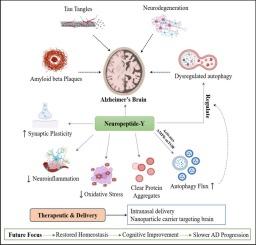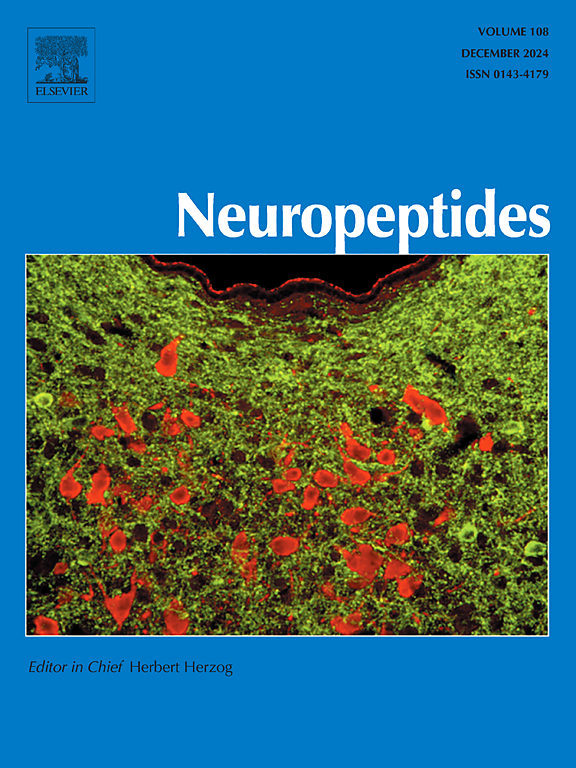Interplay of neuropeptide Y and autophagy in Alzheimer's disease: Therapeutic perspectives and mechanistic insights
IF 2.7
3区 医学
Q3 ENDOCRINOLOGY & METABOLISM
引用次数: 0
Abstract
Alzheimer's disease (AD) is a progressive, chronic, neurodegenerative disorder involving cognitive impairment, neuronal loss, autophagy dysregulation, and toxic protein aggregates build-up, including amyloid-β plaques and hyperphosphorylated tau tangles. Autophagy dysregulation is a central driving force behind AD pathogenesis, interfering with the clearance of these aggregates and resulting in synaptic disruption and enhanced neurodegeneration. Neuropeptide Y (NPY) is abundantly present in the CNS. NPY has been identified as a promising candidate due to its neuropeptidergic activity. It plays a central role in regulating autophagy, anti-inflammation, and the induction of synaptic plasticity. NPY regulates the AMPA-mTOR pathway to restore cellular homeostasis and enhance neuronal survival through improved autophagic flux. It facilitates the clearance of aggregate proteins and dysfunctional cellular components, which lessen the signs of AD pathology. Moreover, NPY plays an important role in stabilizing the mitochondria and enhancing antioxidant action, in effect sustaining cognitive function. The modulatory influence of NPY on autophagy represents a potential novel direction in AD therapy, advanced delivery systems, such as nanoparticle-based carriers, offer promising targeted brain delivery mechanisms. However, clinical application is hindered by the need for a receptor-specific agonist to mitigate side effects and the lengthy trials necessary to assess long-term efficiency. Further research should aim to optimise NPY delivery and autophagy-targeted therapies to develop more effective treatments; such research challenges may position NPY as a breakthrough candidate for slowing cognitive and functional impairment in AD.

神经肽Y和自噬在阿尔茨海默病中的相互作用:治疗观点和机制见解
阿尔茨海默病(AD)是一种进行性、慢性、神经退行性疾病,涉及认知障碍、神经元丧失、自噬失调和有毒蛋白聚集体积聚,包括淀粉样蛋白-β斑块和过度磷酸化的tau缠结。自噬失调是阿尔茨海默病发病机制背后的主要驱动力,它干扰了这些聚集体的清除,导致突触破坏和神经变性加剧。神经肽Y (NPY)在中枢神经系统中大量存在。由于其神经肽能活性,NPY已被确定为有希望的候选药物。它在调节自噬、抗炎症和诱导突触可塑性中起核心作用。NPY调节AMPA-mTOR通路,通过提高自噬通量,恢复细胞稳态,提高神经元存活。它促进了聚集蛋白和功能失调的细胞成分的清除,从而减轻了AD病理的迹象。此外,NPY在稳定线粒体和增强抗氧化作用方面发挥重要作用,有效地维持认知功能。NPY对自噬的调节作用代表了AD治疗的一个潜在的新方向,先进的递送系统,如纳米颗粒载体,提供了有希望的靶向脑递送机制。然而,由于需要受体特异性激动剂来减轻副作用和评估长期疗效所需的漫长试验,临床应用受到阻碍。进一步的研究应着眼于优化NPY递送和自噬靶向治疗,以开发更有效的治疗方法;这些研究挑战可能使NPY成为减缓AD认知和功能损害的突破性候选药物。
本文章由计算机程序翻译,如有差异,请以英文原文为准。
求助全文
约1分钟内获得全文
求助全文
来源期刊

Neuropeptides
医学-内分泌学与代谢
CiteScore
5.40
自引率
6.90%
发文量
55
审稿时长
>12 weeks
期刊介绍:
The aim of Neuropeptides is the rapid publication of original research and review articles, dealing with the structure, distribution, actions and functions of peptides in the central and peripheral nervous systems. The explosion of research activity in this field has led to the identification of numerous naturally occurring endogenous peptides which act as neurotransmitters, neuromodulators, or trophic factors, to mediate nervous system functions. Increasing numbers of non-peptide ligands of neuropeptide receptors have been developed, which act as agonists or antagonists in peptidergic systems.
The journal provides a unique opportunity of integrating the many disciplines involved in all neuropeptide research. The journal publishes articles on all aspects of the neuropeptide field, with particular emphasis on gene regulation of peptide expression, peptide receptor subtypes, transgenic and knockout mice with mutations in genes for neuropeptides and peptide receptors, neuroanatomy, physiology, behaviour, neurotrophic factors, preclinical drug evaluation, clinical studies, and clinical trials.
 求助内容:
求助内容: 应助结果提醒方式:
应助结果提醒方式:


